Aromatherapy for Children: Expert Tips on Everything You Need to Know
Using Essential Oils Around Children: The Basics
Aromatherapy for children is somewhat a complicated topic because there are so many things to consider. The most important thing is safety, of course. But what oils are safe for children? How do you use them? What are the benefits?
When it comes to safety, always err on the side of caution. If you are unsure about an oil, don’t use it. And always consult with a qualified aromatherapist or doctor before using any oils on children under the age of 2.
There are a few general guidelines that can help you choose which oils to use:
- Avoid using essential oils that are known to be photosensitizing (e.g., citrus oils) before going out into the sun.
- Avoid using essential oils that are known to be irritants (e.g., mint oils) on children with sensitive skin.
- Avoid using essential oils that are known to be stimulating (e.g., rosemary oil) before bedtime.
Some of the best essential oils for children that are calming, soothing and good for relaxation include Roman chamomile, lavender, mandarin, and rose. To use essential oils on children, you can:
- Add a few drops of oil to a nebulizing diffuser and let the child breathe in the vapors.
- Add a few drops of oil to a warm bath.
- Add a few drops of oil to a cold compress.
- Massage the child with a carrier oil that has been mixed with a few drops of essential oil.
When using essential oils on children, always remember to:
- Use only a small amount of oil.
- Monitor the child closely for any adverse reactions.
- Stop using the oil immediately if any adverse reactions occur.
There are many benefits that can be gained from using aromatherapy on children. Aromatherapy can help to soothe and calm children, ease anxiety and stress, improve sleep, and boost mood and energy levels. It can also be used to help children focus and concentrate, and to boost immunity.
If you are thinking about using aromatherapy on children, always consult with a qualified aromatherapist or doctor first to ensure safety and effectiveness.
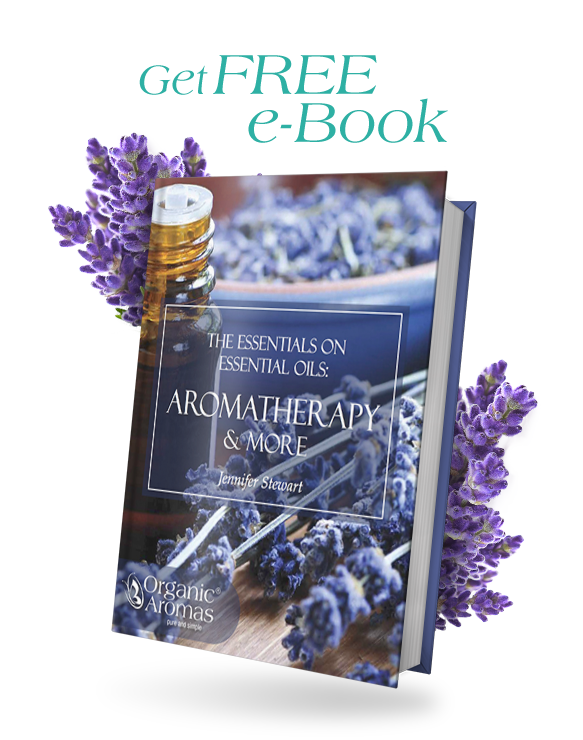
Sign Up to Get Your FREE
e-Book Here…
Q&A Interview With Melissa Murray – Certified Aromatherapist and Expert on Childhood Aromatherapy
To this end, we sought deeper insight into this topic and consulted Melissa Murray (CA, HHP, Certified Aromatherapist)
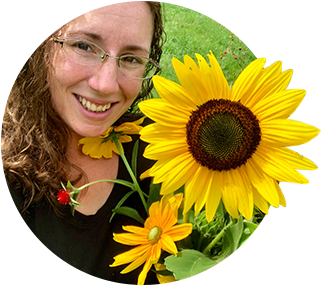
Melissa Murray, CA, HHP is the founder of Airmid Holistics, LLC and the professional crafter and formulator behind the amazing products available at Airmid Holistics. Aromatherapy has been her passion for over 20 years!
She is a NAHA Certified Professional Aromatherapist and graduated from the American College of Healthcare Sciences in 2014 with an Associate’s of Applied Science degree in Complementary Alternative Medicine. She also received a diploma in Aromatherapy, Master Aromatherapist, and a diploma in Holistic Health Practice from the American College of Healthcare Sciences in 2021. During the course of her degree, she studied extensive material on aromatherapy, herbalism, and holistic nutrition.
Along with her membership in the National Association for Holistic Aromatherapy, she is a Professional Member of the Alliance of International Aromatherapists. Melissa is continually expanding her knowledge about essential oils and their many benefits. She is currently preparing for the Aromatherapy Registration Council’s Registered Aromatherapist exam.
Melissa is a proud Army veteran and served for six years before being honorably discharged. As a disabled veteran, she hopes to be able to expand Airmid Holistics into offering low-cost consultations for fellow veterans who would benefit from aromatherapy to help tackle the unique challenges they face after transitioning to civilian life.
Organic Aromas: Tell us more about your expertise and experience in childhood aromatherapy
Melissa: Aromatherapy has always fascinated me and after years of dabbling with essential oils for my own personal wellness I began my path to becoming a certified aromatherapist and holistic health practitioner. I received my Associates degree in Complementary Alternative Medicine from the American College of Healthcare Sciences almost ten years ago and have completed extensive educational training in aromatherapy, herbalism, and holistic nutrition. I delved deeper into aromatherapy with my Master Aromatherapist’s diploma and continued on in my education to focus a significant portion of my time on studying the safe use of essential oils in children.
Organic Aromas: Why did you create a solution that delivers aromatherapy for children?
Melissa: I began to notice a need for aromatherapy related products suitable for children. The misinformation that surrounds the safe practice of using essential oils for children (and adults!) is overwhelming on the Internet. I felt that if parents could have a trusted source to go to, they could feel more at ease using aromatherapy for their little ones. It was my way to take the guesswork out of aromatherapy for them.
Organic Aromas: Explain to us how aromatherapy works in children
Melissa: Essential oils, when used aromatically, enter the body via the nostrils. From there they travel to the olfactory system, the part of the body responsible for our sense of smell. This triggers a response in the limbic system, the emotional center of the brain responsible for controlling heart rate, breathing, blood pressure, memories, and stress levels. Have you ever had a certain smell trigger a long-buried memory? This is why! Molecules are also carried to the lungs and can interact with the respiratory system. When used topically, essential oils pass through the layers of the skin to enter the body. Their active chemical components are absorbed just like common topical pharmaceuticals you may use.
Aromatherapy is generally considered safe when done properly. What does it mean to practice aromatherapy safely in children? Essential oils need to be diluted in carrier oils such as olive oil, sunflower oil, grapeseed oil, etc. at a dilution rate safe for the intended user. With children, this means a dilution much lower than for an adult. We also need to take into consideration the type of essential oil we are using.
Some essential oils that are safe for adults to use shouldn’t be used with children, especially small children. For children under five years old, hydrosols are recommended. Most importantly, essential oils should never be applied ‘neat’, or undiluted, to the skin. Hydrosols are a great way to introduce children to the benefits of aromatherapy as they can be used ‘neat’ without any risk of irritation.
A hydrosol is a by-product of the distillation process used to create essential oils. Hydrosols contain all the water-soluble parts of the plant that are not captured in the essential oil. They are sometimes also referred to as floral waters or flower waters. Rosewater is perhaps the most well-known hydrosol. While hydrosols do not have the concentrated properties of essential oils, they can still be very beneficial and are much less likely to cause skin irritation.
When using hydrosols on children, always do a patch test first and dilute the hydrosol with water if necessary. Avoid using strong-smelling hydrosols on young children as they may be overwhelming. Try lavender or chamomile hydrosols instead.
Organic Aromas: What are some of the most common childhood ailments that can be treated using aromatherapy?
Melissa: A few of the most common childhood complaints that can be helped with aromatherapy are:
- colds and flu
- congestion
- sore throat
- coughing
- stomach bugs
- headaches and migraines
- anxiety and stress
- trouble sleeping or insomnia
- skin irritations such as eczema or cradle cap
There are a few safety considerations to take into account when using essential oils with children. The most important one is to always, always, always dilute your essential oils in a carrier oil before using them topically on children. A good rule of thumb is a 2% dilution for children ages 2-6 and a 3% dilution for children 6+.
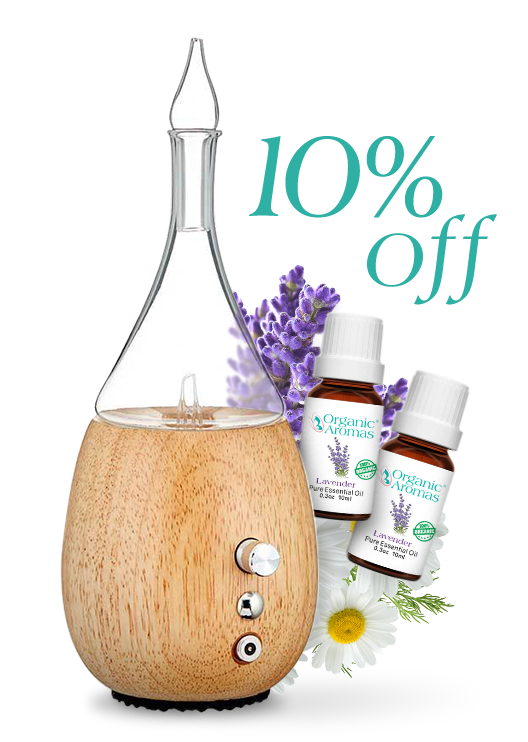
Join Now and Get a Coupon for 10% Off!
Another safety consideration is to avoid using certain essential oils with young children altogether. This is due to their high concentration of certain compounds that can be irritating or harmful to small bodies. Examples of essential oils to avoid using with children under the age of 10 include but are not limited to:
- Eucalyptus
- Peppermint
- Rosemary
- Lemongrass
- Cinnamon
- Thyme
- Clove
- Tea tree oil
Lavender oil should also be avoided on children under the age of 2 due to its potential to cause skin irritation.
Organic Aromas: Share your final thoughts on this topic
Melissa: Remember, just because essential oils are all natural, does not mean they are ‘all safe’! Children are far more sensitive than adults. If you are DIYing a blend for your children, go to a trusted source like a certified aromatherapist to answer your questions (you can find them in a free database on the National Association of Holistic Aromatherapy’s website) and do your due diligence in research.
Do follow the recommended dilution ratios and do NOT apply essential oils undiluted to the skin. Also, check that the oil you are choosing is safe for little ones. Some essential oils are not recommended for young children and can in fact be potentially dangerous. If you prefer to take the guesswork out of your blends, look for pre-made topical blends and diffuser blends made specifically for children. Aromatherapy is an amazing natural way to support wellness for both you AND your child! For more insights, visit AirmidHolistics.com.
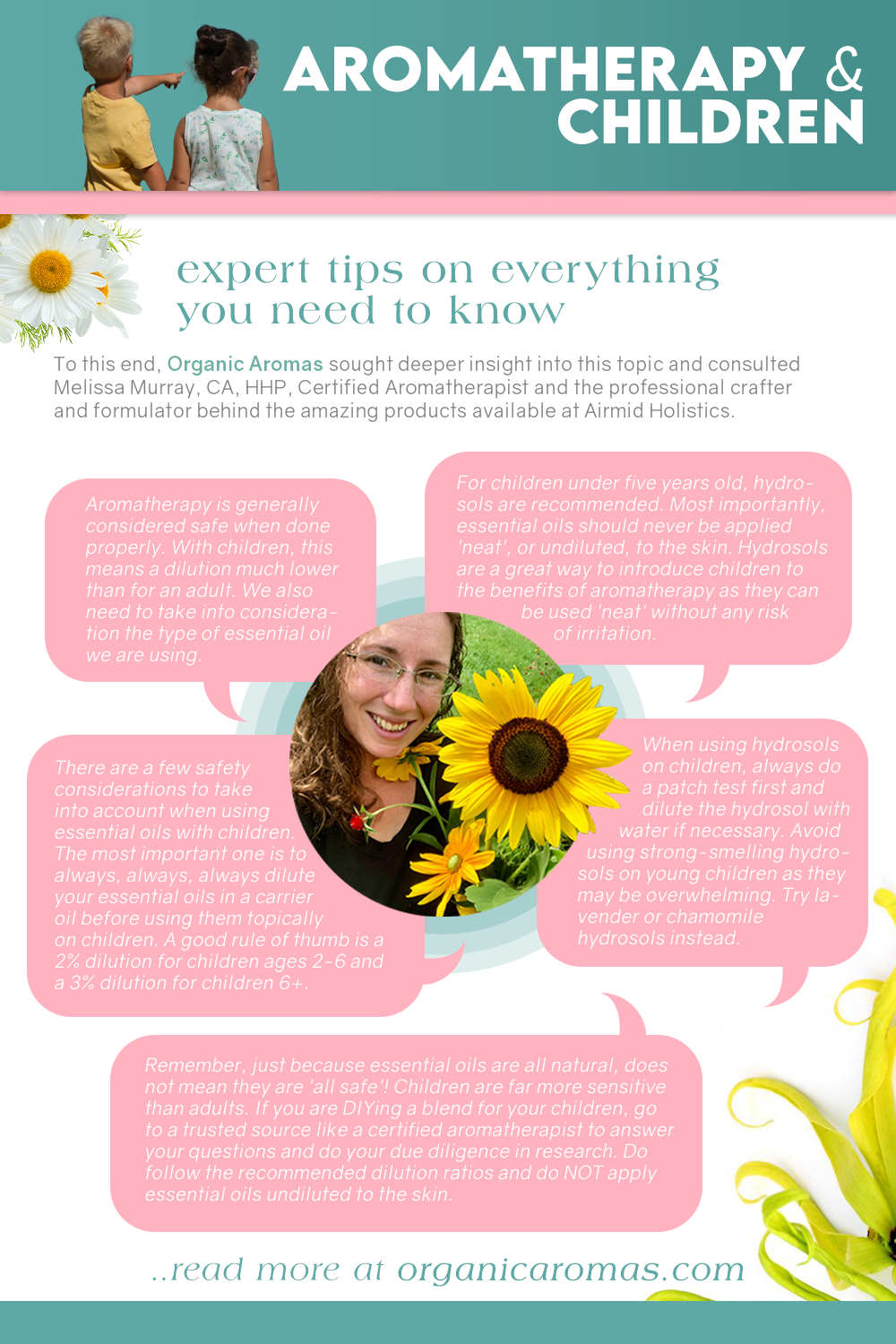
The Statistics
Aromatherapy for children is gaining ground as a complementary therapy with a study published in the International Journal of Aromatherapy finding that 20% of parents surveyed had used aromatherapy on their children. The most common reasons given were for relaxation (60%), respiratory problems (50%), skin complaints (42%) and sleep difficulties (39%). The majority of parents said they were satisfied with the results achieved (84%).
Aromatherapy was found to be particularly helpful for children with eczema, ADHD and autism with parents reporting significant improvements in symptoms.
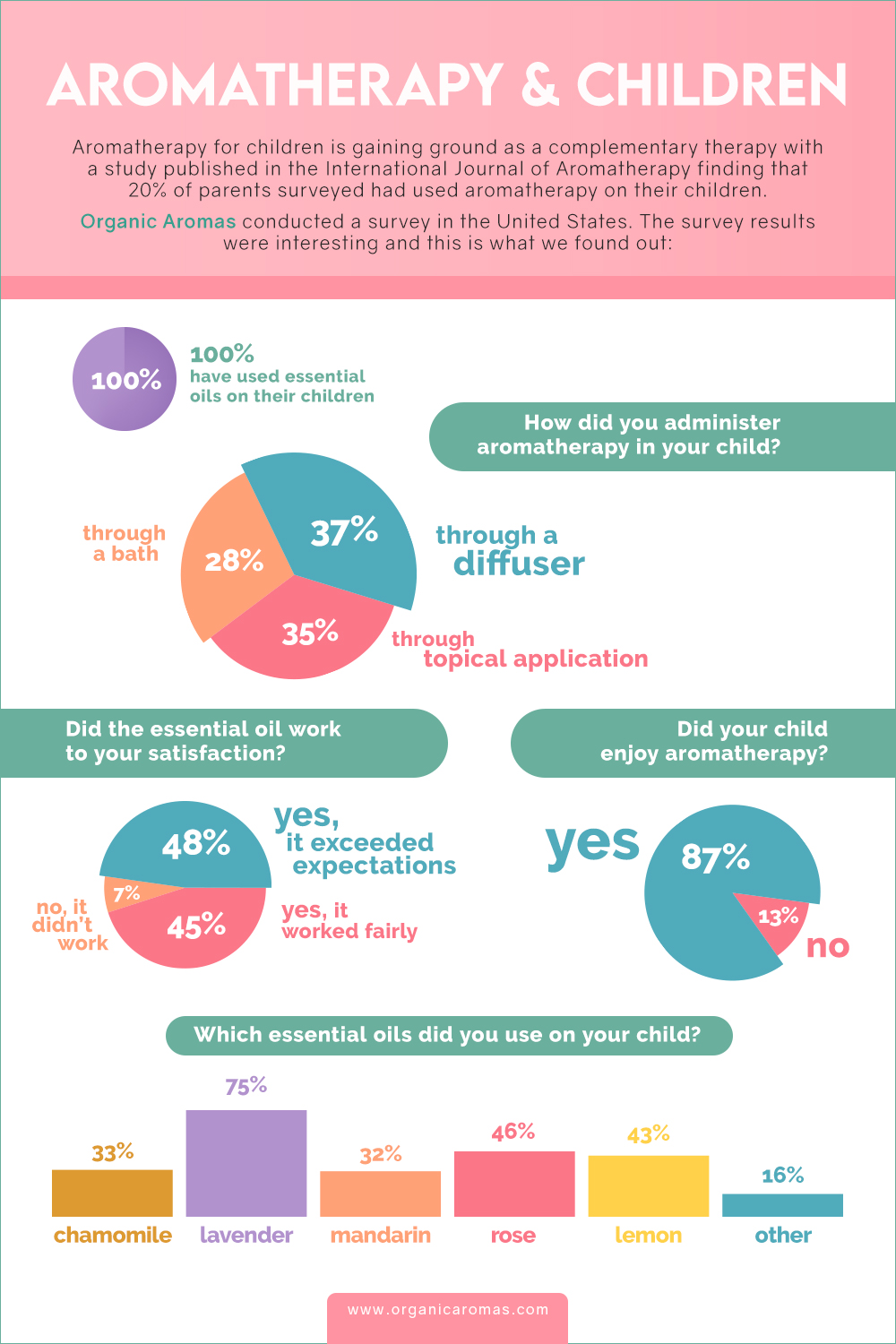
Organic Aromas Survey of Aromatherapy for Children
We decided to conduct our own survey to see the trends in childhood aromatherapy. Our survey targeted 200 parents (28 to 54 years) in the United States who have used essential oils on their children. Our findings were particularly interesting:
75% of respondents stated that they have used lavender essential oil on their children. Rose, lemon, and Roman chamomile consecutively ranked as the most used oils by parents after lavender in our survey. 90% of respondents stated that aromatherapy for their children worked for them. 87% said that their children enjoyed aromatherapy, with 37% of respondents saying that they administered the oils through a diffuser. 35% used topical application while 28% used a bath to deliver aromatherapy to their children. 91% of those surveyed said that they would recommend aromatherapy for children to other parents.
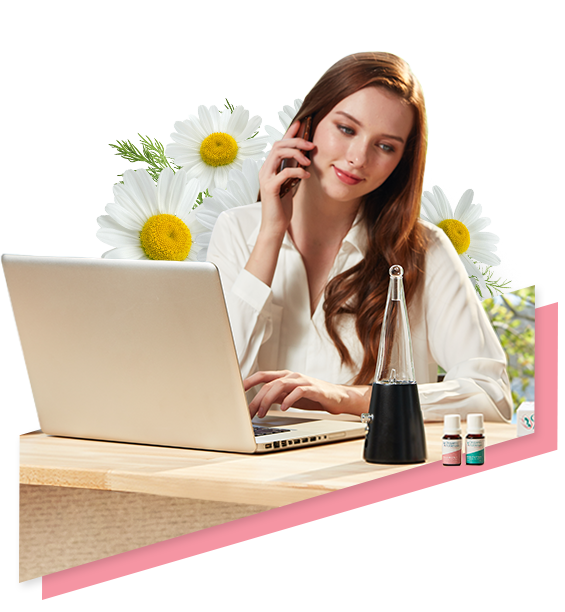
Join Our Exclusive Member Club to get Big Discounts!
Wrapping Things Up
Children are certainly vulnerable to all manner of childhood ailments and parents are always looking for ways to soothe and ease their children’s sufferings. Aromatherapy has been shown to be helpful for many common childhood complaints and our survey found that parents who have used essential oils on their children are generally satisfied with the results. Remember, safety is always the key word when using essential oils on children. Always follow the recommended guidelines for dilution and never apply essential oils undiluted to the skin. With a little care and attention, aromatherapy can be a wonderful way to support your child’s health and wellbeing.
Organic Aromas would like to thank Melissa for her insights into this topic. If you have any further questions, please do not hesitate to contact us, or share your thoughts on the comments section below.
Frequently Asked Questions (FAQs)
What are the safest essential oils to use on children?
Lavender, chamomile, and mandarin are considered safe and beneficial for children when used appropriately and diluted properly.
How can aromatherapy benefit children?
Aromatherapy can help soothe and calm children, ease anxiety, promote better sleep, and even assist in managing symptoms of colds and flu.
At what age can children start using aromatherapy?
While essential oils can be used with care under professional guidance, it’s generally recommended to consult a pediatrician or aromatherapist before using aromatherapy on children under two years old.
Are there any essential oils that should be avoided for young children?
Yes, essential oils like eucalyptus, peppermint, and rosemary should be avoided in young children due to their potent properties and potential side effects.
Can aromatherapy be used in schools for children?
While individual use at home is common, the use of aromatherapy in schools would require careful consideration of all students’ health needs and potential allergies.

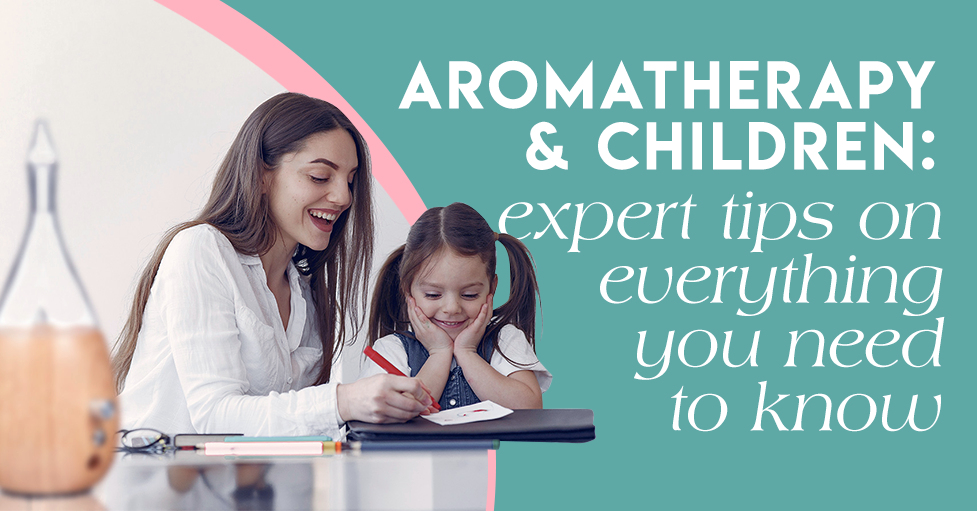
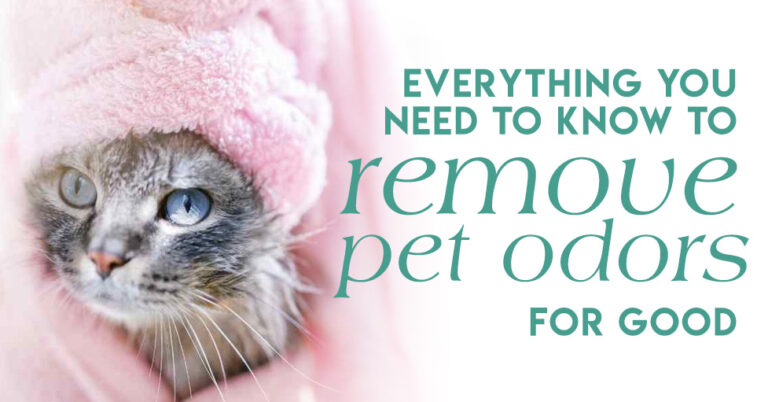
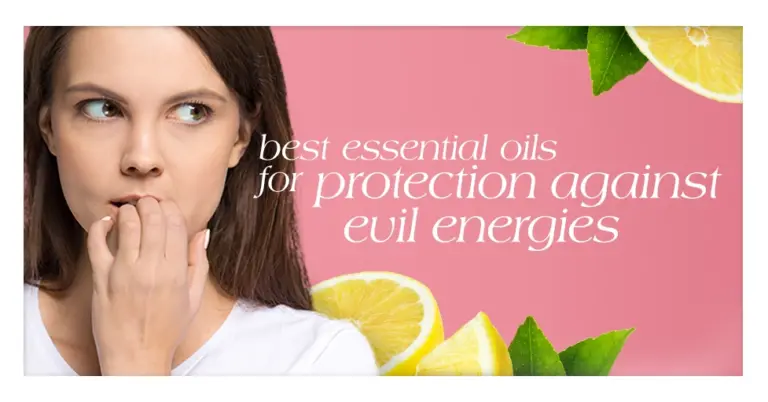
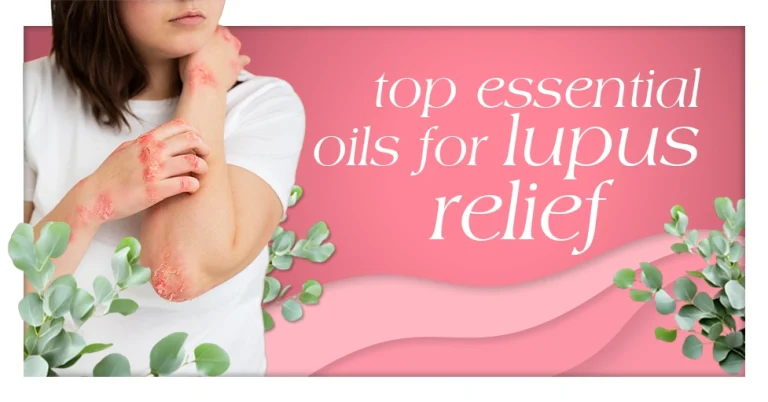
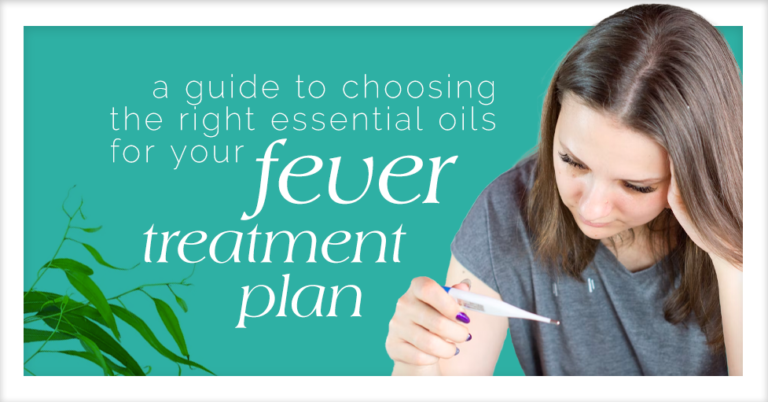
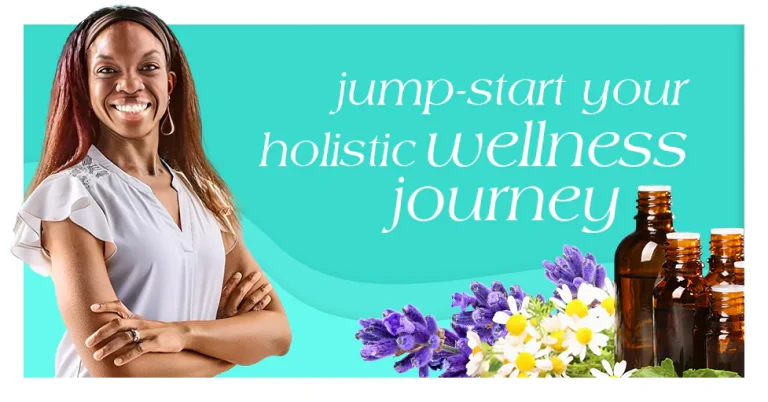
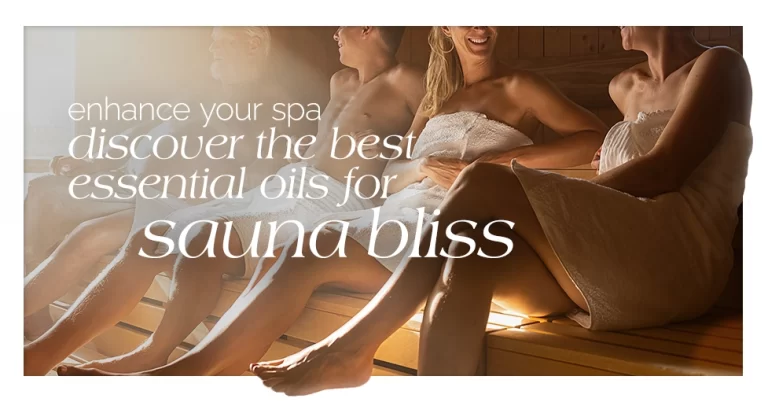
Very informative.
Hmmm this seems very interesting. I will definitely try it out.
My teenage daughter uses aromatherapy for anxiety and stress.
This is so good to know! noting it down.
Thank you for this. It is really going to help..
Very informative article. Good to know.
WHO knew?
Are any of these safe for an asthmatic child?
Great article.
Great article. I didn’t k now about essential oils for children, I learned a lot. Thanks
I’ve only recently became interested in essential oils. Still lots to learn.
Thanks for the read – I love anything to do with essential oils.
Thanks for the interesting article. I don’t know much about essential oils.
Love that you can use these to calm your child down
The tips were great.
thanks, i bet the eucalyptus helps clear sinuses
Great tips
Fascinating ! Very good active
Interesting tips – thanks!
Great article!!
really interesting, I will suggest this article to my daughter
I don’t have children but these are good tips. Thanks!
I had no idea children could use it.
i really wish this had been more mainstream when my children were young. our aromatherapy started and ended with vaporub! this is so much better.
Thanks alot for the useful tips!
Great tips. I don’t have children but will be passing this information along to my sister-in-law for her little ones.
Love this
Lavender is such a wonderful calming scent, and like everything, you need to be mindful of quantities when using with kids.
They do indeed calm them down and puts them to sleep faster.
This is so good to know Thanks for the important info.
I love the information and that you also include ones to avoid. Thanks!
will have to try something calming for my daughter’s stress/anxiety. thanks!
We love using Lavendar in the evenings! That’s the only one we really use right now and I’m so excited to learn about others.
Thanks for this wonderful tips
I have always suffered a lot from colds and sore throat and cough so i think i will start implementing this method! Thanks for the info!
Very interesting info I’ve struggled previously to find reliable info on the use of aromatherapy in children thank you
tips always help
My children are adults now, but good info!
Thanks for the article. I know certain blends have been able to calm down my child from anxiety.
Woo-hoo! I work with children and families so this info. is very helpful! Thanks!
Very informative
nice
Thanks!
I love all the great tips, thanks for the awesome blog.
Thank# for sharing
aromatherapy is so beneficial to everyone. I Used lavender with my kids to help them settle in at night
THANK YOU FOR THE INFO 😉
Lavendar always had positive calming effects for my son
Good to know
Helpful information if you have kids or want to learn some stuff!
Thanks for the useful info!
This would be very helpful for hyperactive children
Interesting, I no longer have littles but my friends who do would be very interested in this info
Great tips, thanks!
I have three little ones so its definitely helpdul to have these tips on hand!
Very informative, thank you!
Super helpful information! A lot to take in and remember!
I don’t have kids, but it’s always good to know these things because we do use essential oils at home. Mostly for the diffuser, but still. 🙂
Thanks for the advice
I had no idea citrus oils should not be applied prior to going in the sun! Thank you for so much helpful information on not just the benefits of essential oils but the dangers also.
Thanks for sharing I learned a lot :0
thank you! love the pictures
Awesome
Didn’t even realize there were differences for adults and children. Love all the tips.
A diffuser with essential oils added are great for children that don’t always sleep peacefully.
I want this to be a part of my children’s lives!
Thank you for the tips!!!
No littles in the house here. But sharing this information with my grandchild parents
Wow Wee, what an interesting read with so many facts and helpful idea’s and I thought I knew quite a bit. You are never too old to learn more!
Whatever helps!
Thank you for the information! I was curious about using diffusers for my kids.
I’ve always gone for natural approaches for my kiddos- great tips here- thank you!
I like the lavender essential oil, so I’m glad that is also safe for my child.
Thank you for sharing this
Nothing about possible allergies?
❤️
Would love one for my grandkids
Not using essential oil kniwn to be stimulating is actually new information to me! Thank you for sharing these! 🥰
My daughter has ADHD & we love using aromatherapy for her!
Great information! Will keep them in mind.
Would have loved to have this growing up!
Good article.
This is a very informative article. I like that it lists what is suitable to use with children.
Fascinating article, thank you
Having taught in the public schools for over 25 years, I learned the calming effect that aroma therapy in connection with “mood music” can have on children. I can relate to much of the information presented in this blog.
aroma theropy is good for everyone! who doesnt love good smells? our memories are even ingrained in us through smalls scents and pheromones. life prospers in aroma rich places. i hope to win so i can use some of the prize to get more good aromas in my living areas of my home.
🔥🔥🔥
Wow I’ll make sure to follow these tips when I have children one day! Thanks for sharing!
That’s interesting I’ll try 🙂
I don’t have little children anymore, but your information is useful and interesting!!
My daughter would love this!
Very useful information, thanks for sharing!
Great blog post – thanks for the hard work!
Great info here for parents and caregivers…glad I’m neither, lol
I never knew mint was an irritant!
Thanks for the info!
HERE I LEARNED NEW THINGS. THANKS A LOT.
I was leary of using the oils with my children, but you have given me some great suggestions
I work at a school, and anxiety levels in children are so much higher ever since COVID. This sounds like a wonderful option to help these kids.
I never realized children could be troubled by essential oils. Other oils I would have been careful with.
My sister has always used essential oils with her 4 kids, so that’s good enough for me! Just make sure ALL essential oils are out of areas that children can reach. Thx for these tips!
Great information for using oil on children. I Didn’t know all of this.
Ok i am willing to try this out
Love aromatherapy & I never knew mint was an irritant! Great article.
Thanks for the information!
Really useful to know this
Great to know ! Thanks
Thanks for the info!
Great tips and very informative
This article was quite informative and interesting. Thank you
Lots of great info! Kids can benefit from essential oils as well!
This is useful information for my children and grandchildren.
I didn’t realize that mint oils were irritants. I don’t think I will use them.
Great info for parents
thanks for the info
Thanks for this information, very informative!
I have kids so this is helpful information!
I very much appreciate that a certified aromatherapist was consulted for this article. Thank you for the expert tips!
I don’t have any children that would benefit from aromatherapy….but I sure could use it myself.
Would DEFINITELY not use rosemary before bedtime lol always lavender ! Ty for all the great info on citrus 🍊 and different scents and different side effects one can have ,never knew citrus in children would cause photosensitivity !
Definitely the lavender at bedtime helps kiddos with anxiety
great article! 🙂
I made a mistake once about rubbing mint oil on my kid and it’s never gonna happen again. This one here truly adds more insight into my knowledge of aromatherapy for children. Thanks.
thanks. great info!
No kids here but wish there was more awareness when I was a child
This seems like an easy, no nonsense way to improve the lives of children.
So important to know that not all “natural products” are safe for everyone. It’s important to research as they aren’t regulated like other products
Great tips for sure! I am so thankful you shared this.
Awesome tips!
Great tips!
This was super interesting!
great info
Great read. Thanks for the wonderful information!!
thanks for the great information!
Very informative. Children today deal with so much peer pressure and anxiety. They can definitely benefit from aromatherapy.
Aromatherapy for children is so very important.
This would be great for my 12 year old
Love these essential oil ideas for calming, soothing and relaxation for the kids
great information, thanks
Great info!
I would steer clear of heavy scents for younger children but there is no doubt that esssential oils woek.
So many things to take into account. Thank you.
good to know
You learn something new everyday.
Thanks for this important information!
Thanks for sharing this great information.
Thanks so much for sharing this– really helpful information!
Wow so interesting!
Really useful. No need to do more research after finding thus! Thank you.
thanks never knew. great information
My mom used essential oils on me when I was little. Love them to this day.
Have been doing this for 2 years now
Was thinking if this would help
!!!!!!!!!!!!!
Great and informative information.
good to know
The dilution rates are very important to know.
My son really liked having a diffuser in his room with Lavender oil at night. He chose to stop using it but he can be sensitive to smell and taste.
Great advice and very interesting information. Thanks
Every parent (and grandparent) should read this! I know this will help with my little one’s croup.
Interesting article thanks
Such great information!
Very interesting information. My son has very sensitive skin so will have to try some different aromatherapy options. I did not know lavender could be irritating for very young children.
Great ideas! I think eucalyptus will definitely be on our list.
I used tea tree oil in my son’s nebulizer, really made them more effective.
Another worthwhile article, thx!
Good to know there are safer options out there like essential oils that aren’t chemicals!
I never thought about using oils with children.
Another worthwhile article!
Thanks for sharing. Very informative.
Great information
Wow this is such great info.. learn something new everyday huh!!
great info
Great information! I never knew that children benefited from Aromatherapy.
Good info. thanks so much
Great article!
Nice info
This article should be sent to every parent. A huge help.😁😁😁👍👍👍❤❤
thanks for doing the research to make this article, best regards
I never knew that. Thanks.
thanks for this informative article, never thought that it can make a difference for my kids
Eucalyptus our fav
good to know, will apply this to my kidss
Nice article!
Wow this really gives a lot of interesting info. Wish I knew of this when my kids were little.
We certainly started carefully, but now our kids apply oils from rollers themselves! Lavender Lemon and Peppermint are especially effective together.
thanks for all the info
going to share this with my niece who has a 5 yr old daughter. Zay was spending the day with me and she was all stuffed up and would not have anything to do with Vicks. Well as a lot of taking she let me take eucalyptus oil and place in on the inside of her shirt. Showed her how to pull it up over and nose and take a deep breath. Send a bottle home with her mother and they used it several times. In the middle of the night she woke her mother up and said she need that stuff on her shirt. It has been over a year and she still ask for the oil when she need s it
thanks for the tips
Adding it to a bath is a smart idea!
lol, looking forward to the next time the kids get sick so we can try this!
It is all about knowing what essential oils are good for kids and about how to administer them. This was a nice read!
Very informative article. The benefits of aromatherapy are amazing.
good to know
This information is wonderful to know. I had no idea that it was different for children.
that is an informative article, i will try it with my kids
So much wonderful information!
Nice tips, thanks
Aromatherapy can help children develop their senses
Ok diffuser
Great concept – start them young !!
thanks for the tips
Wonderful Article!
forwarded to the parents of my grandkids
good
Like the idea of using oils for children but you have to be really careful to not use too much, good tips.
A lot of knowledge here. Luckily my children are now grown!
Thank you for the tips.
Great information on what oils not to use on/with children. I would have thought Lavender would have been a good one to use but now I know you shouldn’t use it on children under 2.
Good information to know!
Helpful information.
Very nice tips!
nice tips thx
Good advise.
Thanks for the tips
Consejos muy importantes para los niños
Once again, great article and great tips. Thanks for sharing!
best info ever 😀
Nice thoughts
I will keep this in mind when I have children
Thanks
If it is for children, it is very importante. Thanks
Great info
I like a couple of drops of lavender in a bath.
Yes! You must always be very cautious and vigilant with essential oils, especially with children!
What if these would be helpful for migraines.
Well researched. Thanks!
Great information for parents.
Really great information. These tips will come in handy for managing cold and flu season.
Interesting informationn.
So interesting.
Hope my kids can benefit from this.
I wish I had known about the use of essential oils when my children were young. I could have perhaps used essential oils to help with their focusing and concentration, as well as easing their headaches and migraines.
Fascinating Tips
Interesting
Interesting ideas!
Great information.
Helpful article as I was concerned about trying aromatherapy with children
never heard it before
I don’t have any kids but this is useful information for parents!
I use essential oils behind the ears of my child that gets car sickness. works well.
I wish I had had this information when my children were little.
Very interesting
Good info!
very well
I totally agree. Mothers should be made aware of this topic, already in the gynecology departments
One has to be careful with the amount of drops with children
Wow! Thanks for the indepth and very helpful article. I appreciate all the great advice and tips.
I can’t wait to try these tips. Thank you.
Great info thank you
Very informative article. Thanks for sharing.
makes me feel so much better using aromatherapy rather than medication
Educational info
This will be beneficial for when I do have children.
great tips & info
As a newbie to essential oils, I need to fully grasp the benefits before letting my grands do it.
Appreciate the not only the do’s but the don’t’s as well!
Aromatherapy is very calming.
informative
My kids have benefited greatly from oils, including managing their allergies!
Very informative article. Good to know. Thanks for sharing.
I’ve forwarded this to a friend whose grandchildren might benefit.
Very good advice for children!
I love this!
Thank you! Loved the tips!
Thanks for the graph on the Organic Aromas Survey of Aromatherapy for Children!
Lovely tips!
Love the tips and graphics – so nice!